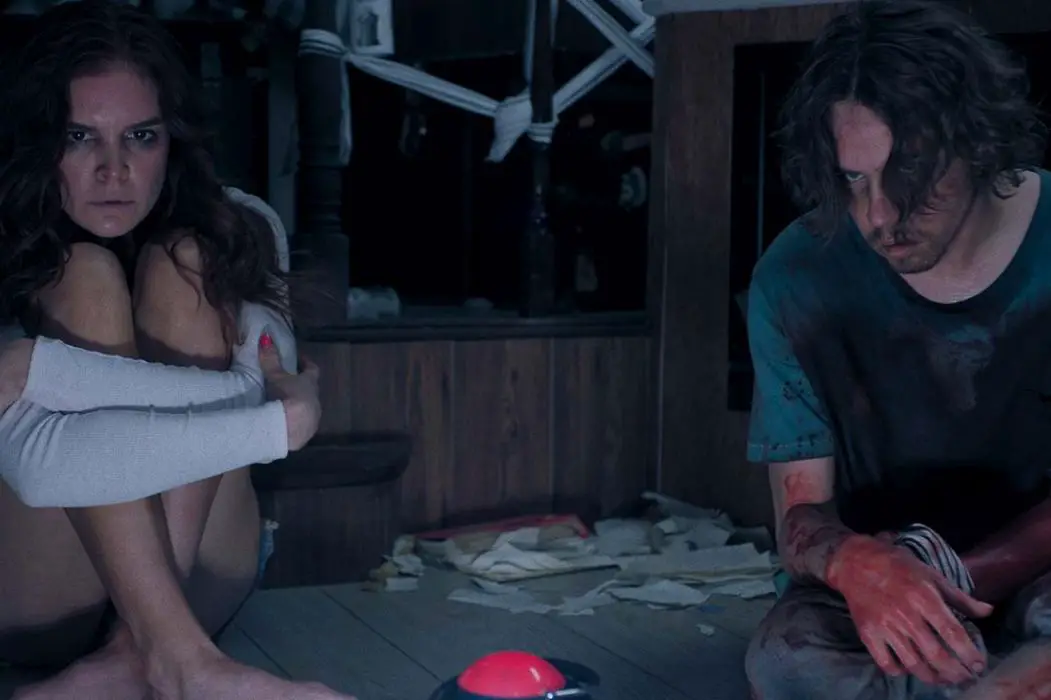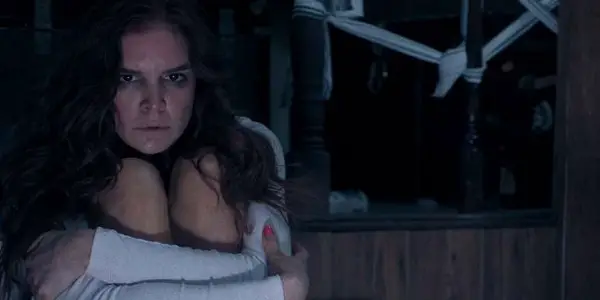HARPOON: A Deliciously Twisted Boat Trip

Andrew Stover is a film critic/writer from the Chicagoland. His…
Being lost at sea, only to lose a grasp on one’s reality and emotions, is a very conventional template for survival stories. From a distance, the ocean is beautiful, indulging your senses with an essence of tranquility and freedom. But not every journey across the sea gets you to where you’re going, even if your destination is pinpointed by the place of utmost serenity or unregulated fun. In Rob Grant’s Harpoon, he mentions a prolific amount of oceanic literature, translating the misfortune of those tales to generate a zany, blood-gushing picture of uncalculated madness and despair.
In Harpoon, the inexperienced sailors are best friends Richard (Christopher Gray), Jonah (Munro Chambers) and Sasha (Emily Tyra), who venture on a yachting expedition for bliss, only to end up stranded. They’re immediately compelled to confront direful revelations and life-changing decisions, often leading to blood-soaked thrills and chills.

Brett Gelman’s narration opens the picture, comically informing the audience of the essential details regarding the three main characters. Richard is a prickly, blonde and affluent young man, whose aggression is incredibly unmeasured and whose wealth was passed down by his father. Jonah is quite dorky, and he’s also a victim of familial tragedy. Although Jonah is a reliable friend, he’s treated badly by Richard, essentially becoming Richard’s own walking punching bag. Sasha is the tetchy, quick-thinking one who keeps the two of them from killing each other, and she’s also Richard’s girlfriend.
Soon enough, Richard attacks a defenseless and utterly clueless Jonah in his own home, propelling Sasha to halt his ill-advised rage. Apparently, Richard is reacting to a series of texts he saw between Sasha and Jonah, convinced they must be having an affair. Thankfully, Sasha and Jonah persuade Richard the allegations are false, and they were simply discussing a wooden Harpoon (or spear gun) they purchased for Richard’s upcoming birthday. In an attempt to win back their trust, Richard takes them out on his lavish yacht “The Naughty Buoy” for a day at sea filled with partying and innocuous redemption. All fun recedes as the engine breaks down, and the three friends must wrestle with weighty, detrimental truths that’ll quickly penetrate their walls of friendship. Having limited (if any) food, water or supplies only amplifies their impetuous reactions, and a boat trip to hell temptingly ensues.
“The Sea Finds Out Everything You’ve Done Wrong.”
The film opens to Gelman’s blunt narration, which operates as a sustained dark comedy mechanism while also categorically expressing the levels of friendship: The friendship of utility (like a co-worker), the friendship of pleasure, and friendship of the good (mutual respect). As Gelman enlightens us during the first few minutes, Grant goes on to lightly examine the intricacies of friendships by arranging three seemingly tight-knit allies misplaced at sea, unwittingly igniting a series of truths that will demolish the core of their friendship. There’s a running joke in the movie about how the harpoon Jonah and Sasha purchased for Richard’s birthday is actually a speargun. The movie title deliberately lies to you, but the crew’s relationship is built on lies, so it’s hilariously felicitous.
The three characters are first introduced by Gelman, who goes on to describe them based on their most glaring attributes. Richard is the capricious and troubled young man, entitled by money. Jonah calmly weathers Richard’s wrath and hints to a stony heart. Sasha arrives on-screen as a mediator, vaguely motivated by rivalry, vindication and panic. Richard rushes into Jonah’s home and viciously punches and throws him around like a rag doll — and like a cruel joke, the camera gently oscillates around, but refraining itself from intruding on the beating (the punches thrown and the dishes broken aren’t explicitly seen, but they’re heard), mocking Jonah’s pain. It isn’t until Sasha bolts in that Richard’s fury is resolved. Just by this scene alone, it’s clear that none of these characters are likable, but that doesn’t mean that they’re never relatable or identifiable. These types of friends exist.

The colleagues we sometimes invest our interest in for sake of material gain over any kind of compatible, deep-seated friendship is grossly common. Other friendships can be glued together by more libidinous or illicit means. For years, Richard bestowed Jonah and Sasha with practical gratification (money), but that’s his corrupted way of buying the delectation of friends. Alas, Grant doesn’t get under the surface of friendship complexities, but he does exhume the laughs and winces in between the banter. Grant immediately yields to a twisted sense of humor, one that’s followed by showy violence, stagy tension or self-satisfied raillery. When these three set sail on “The Naughty Buoy”, secrets are unveiled and loyalties shift — then again, their friendship showed no signs of functionality, just compelling toxicity.
Caught between Richard’s ire and Jonah’s frustration, Sasha is forced to undergo the effects of poisonous virility. Harpoon follows three squalid friends, who, after being stranded in the middle of the ocean, are only now realizing that the threads that keep them emotionally attached are rather flimsy, if non-existent. Incorporate the customary body scabs and bodily malfunctions, dehydration, famine, isolation and mental deterioration, and sprinkle those factors in the mix of an already wobbly friendship, the suspicion and distrust swiftly progress into savagery. And because each character is constantly looking to one-up the other, the viewer’s expectations of the characters regularly alter course. As seclusion, hydration and food deprivation kicks in full gear, more originally concealed character depth is unearthed (with some divulgences being more forbidding than others), and there’s no returning to the time before they got stranded, and before madness and masculinity manipulated this outcome.
Despite the small cast, the chemistry between Christopher Gray, Munro Chambers and Emily Tyra is deliciously malicious, evoking a feature-length, wayward quarrel that’s playfully depraved and heedfully steered. The script offers a few conveniences, but it also gives the cast snarky dialogue that magnifies each revelation and secret that’s inevitably revealed. Throughout, characters initiate and lose moral authority, and they contemplate dire decisions to stay alive (picking three straws, and the smallest straw gets the bullet). The social fabrication of each character are forcefully bent or punctured, letting the fear of death overwhelm their grubby secrets and causing them to erupt unpredictably.
Diverting Direction & Control
In this brisk 80-minute horror-comedy, you’ll squirm and smirk, laugh and gasp. Grant’s execution is consistently self-aware: Sasha references Edgar Allan Poe and the Life of Pi, while Jonah cites the original tale of Richard Parker’s bad luck. By no means are the literary references subtle, they aren’t supposed to be, but they’re also introduced and then easily forgotten.
What’s not forgotten is the geography of where the terror unfolds: a constricted yacht in the middle of the ocean, underneath the scorching sun. Albeit the group is stranded for over five days, Grant chooses to film during the searing daylight. This course of action pays off, speaking as all of the wounds this little friendship endures, corrodes more deeply in broad daylight, where all scars and infections are seen more clearly.

When dealing with restricted space, habile (or at the very least, passable) direction is necessary. Throughout the picture, Charles Hamilton‘s cinematography prospers on prudent close-up/reaction shots, allowing viewers to observe the skepticism vividly plastered on the performers’ faces. The actors’ ability to radiate fluctuating feelings without saying a single word, helps vivify how they may respond and makes sense of the violence. Of course, reacting out of violence should never be condoned, but these characters have already proven to have a duplicitous side infused with temper and lust.
The self-awareness deftly cultivates the dark hilarity, keeping its comedic roots firmly embedded in every ounce of barbarity and betrayal that transpires between the group. Gelman’s narration is handled in a fashion that portrays him as a detached god, pointing out character faults and sailor superstitions (Don’t kill seagulls and don’t bring a Jonah on-board). It can be an overused technique, but Gelman’s presence keeps audiences informed — all the while taunting the characters and kindling the sense of complete and utter doom.
Harpoon Reels You Into A Stomach-Churning Boat Trip
The stability between black comedy and horror does get a bit muddled in the end — as the tonal movements become abrupt — but it’s still continually amusing. Rob Grant’s Harpoon is a mean-spirited genre film, meshing lurid blood splatter, contumelious repartee and mental deterioration. Richard, Jonah and Sasha are caught in a love triangle, heading straight into a self-created iceberg. Harpoon never gets deep enough to attain full authenticity, but it’s still a fittingly tense and amusingly deranged romp, poking fun at how incredibly low these people are drowning into moral abyss.
What is your favorite horror-comedy? Let us know in the comments!
Watch Harpoon
Does content like this matter to you?
Become a Member and support film journalism. Unlock access to all of Film Inquiry`s great articles. Join a community of like-minded readers who are passionate about cinema - get access to our private members Network, give back to independent filmmakers, and more.
Andrew Stover is a film critic/writer from the Chicagoland. His film & TV reviews can be found on Film Inquiry & Film Threat.













